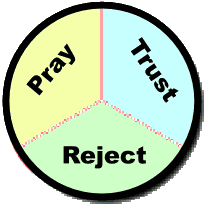
Steps to Waiting on God
Isaiah 38
Paul J. Bucknell
_________________________
Waiting Upon the Lord | Waiting & Planning | Steps to Waiting | Fail to Waiting
Biblical Perspective on Waiting| Waiting for Ministry |Waiting for Revenge
Waiting for a Wife | Trusting through Treachery | Waiting for Christ's Return
Study Questions | Testimonies on Waiting Upon the Lord | Godly Man Index
Purpose
Steps to Waiting on God uses the story of King Hezekiah in Isaiah 38 who all of a sudden heard about his oncoming death. We find three key principles to shape our own decision making. Part of the Waiting On God series.
We have often heard the phrase 'waiting on God.' We know it is important but are not sure how it fits into our Christian lives. Sometimes the actual word 'waiting' or the phrase 'waiting on God' or 'waiting upon God' is used in a scriptural passage.
At other times, however the teaching is present without the express words 'to wait upon the Lord.' This slice into Hezekiah's life is like that. It gives us practical steps to waiting on God.
HEZEKIAH
A CRISIS FOR TESTING
Hezekiah gives us an example of waiting on God. He just heard some shocking news
In those days Hezekiah became mortally ill. And Isaiah the prophet the son of Amoz came to him and said to him, "Thus says the LORD, "Set your house in order, for you shall die and not live.' " (Isaiah 38:1).
 Hezekiah heard that he was going to die. This left him desperate just like it would leave you or me - absolutely shaken. The time frame for waiting here compared to Abraham is much shorter. We are talking about days rather than decades with Abraham. The training is different. But Hezekiah's matter was urgent. How would Hezekiah respond?
Hezekiah heard that he was going to die. This left him desperate just like it would leave you or me - absolutely shaken. The time frame for waiting here compared to Abraham is much shorter. We are talking about days rather than decades with Abraham. The training is different. But Hezekiah's matter was urgent. How would Hezekiah respond?
We should note that God left no other door open for Hezekiah than absolute rejection of God. God simply announced through His prophet that he was going to die. There was no offer of promise that if he did this or that, then God would heal him.
We often read this story as if God had given him a promise. But this is not the case here. So how did Hezekiah respond? How would you have responded?
Then Hezekiah turned his face to the wall, and prayed to the LORD, and said, "Remember now, O LORD, I beseech Thee, how I have walked before Thee in truth and with a whole heart, and have done what is good in Thy sight." And Hezekiah wept bitterly. (Isaiah 38:2,3, NASB).
This announcement brought Hezekiah down on his knees to wait upon the Lord. He desperately prayed. Although his circumstances would be much different than ours, I believe we can see three important principles to waiting upon the Lord.
- Trust
If we do not trust God, then we will get bitter. We will believe His love or doubt it. This is the ultimate test. The testing forces us to make an important decision on how we will relate to the Lord. If we believe the Lord doesn't care for us, then we will turn to despair (I am doomed), self-help books (own resources) or bitterness.
Previous trust is important to establish a trust decision during a crisis. Hezekiah made this trust decision. He turned to God rather than away from Him. If we can't clearly think at such a time, just remember to turn toward the Lord.
If we can't clearly think at such a time, just remember to turn toward the Lord.
--- Purchase The Godly Man and its ten studies in easy epub or pdf format!
- Reject
We must consciously turn away from using other resources that we could turn to. We need to reject paths without God. The text is silent about this. But from this silence, we see that Hezekiah did not pull our his kingly reserves and see what could be done. This is because he believed God's message. Hezekiah would die. This was the end of his life.
He realized that he had nothing else to trust in. He could have tested God's Word by seeking medical help or the sage of philosophers, but he didn't. If we are a bit confused as to what the next step is, remember that we are not to first look at our resources. We need to reject them, even consciously if needed. We need to trust in the Lord for His methods.
- Pray
My advice to people seeking God's will is to pray and stop thinking; pray and stop planning; pray and stop talking. Did you ever talk with someone who was willing to talk to everyone but God about His problems?!
Prayer is prayer. We are called to talk to God about our problems so we can sense what we should do. To be true, prayer does take on many forms and means, but essentially it is talking to God about your circumstances. We need to seek the Lord in prayer. Hezekiah had two parts to his prayer.
- He asked God to remember him.
Hezekiah needed God to remember his own plight. No one else could change things. Does anyone believe that God did not remember his situation? I doubt it. God knows everything. We can't say He forgot someone like we sometimes do. More than this, King Hezekiah stated asked God to remember him now. He really believed the prophet's word about his impending death. His window of life was short. He needed instant action.
- He told God about his life.
This might sound a bit strange, but Hezekiah wanted God to remember what kind of life he had lived up to this point. If for any reason it was blocked from God's mind, Hezekiah believed his life was important enough to tell God about it. This was essentially telling God about his life and goals. He was no doubt hoping that God would reevaluate his circumstances. However, Hezekiah came short of asking God for healing. This didn't seem to make a bit of difference.
- He asked God to remember him.
Hezekiah's prayer ended with bitter tears as his amen. The words he sent before God were soaked in tears from his heart. Various people will pray differently but all must pray if they are to wait upon God.
The Lord heard his desperate prayer. He did not need to wait long on God for an answer, but He did wait. He received an additional 15 years of life.
After his illness and recovery, King Hezekiah wrote a poem of thanks to God.
A writing of Hezekiah king of Judah, after his illness and recovery: I said, "In the middle of my life I am to enter the gates of Sheol; I am to be deprived of the rest of my years." I said, "I shall not see the LORD, The LORD in the land of the living; I shall look on man no more among the inhabitants of the world. "Like a shepherd's tent my dwelling is pulled up and removed from me; As a weaver I rolled up my life. He cuts me off from the loom; From day until night Thou dost make an end of me. "I composed my soul until morning. Like a lion--so He breaks all my bones, From day until night Thou dost make an end of me. "Like a swallow, like a crane, so I twitter; I moan like a dove; My eyes look wistfully to the heights; O Lord, I am oppressed, be my security. "What shall I say? For He has spoken to me, and He Himself has done it; I shall wander about all my years because of the bitterness of my soul. "O Lord, by these things men live; And in all these is the life of my spirit; O restore me to health, and let me live! "Lo, for my own welfare I had great bitterness; It is Thou who hast kept my soul from the pit of nothingness, For Thou hast cast all my sins behind Thy back. "For Sheol cannot thank Thee, Death cannot praise Thee; Those who go down to the pit cannot hope for Thy faithfulness. "It is the living who give thanks to Thee, as I do today; A father tells his sons about Thy faithfulness. "The LORD will surely save me; So we will play my songs on stringed instruments All the days of our life at the house of the LORD." (Isaiah 38:9-20). |











 Other great resources on Waiting Upon God!
Other great resources on Waiting Upon God!